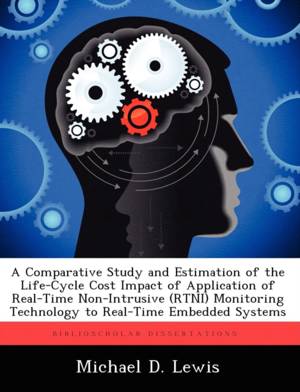
- Afhalen na 1 uur in een winkel met voorraad
- Gratis thuislevering in België vanaf € 30
- Ruim aanbod met 7 miljoen producten
- Afhalen na 1 uur in een winkel met voorraad
- Gratis thuislevering in België vanaf € 30
- Ruim aanbod met 7 miljoen producten
Zoeken
A Comparative Study and Estimation of the Life-Cycle Cost Impact of Application of Real-Time Non-Intrusive (Rtni) Monitoring Technology to Real-Time
Michael D Lewis
Paperback | Engels
€ 54,45
+ 108 punten
Omschrijving
The use of real-time non-intrusive (RTNI) monitoring has had an impact on life-cycle costs of existing programs through a reduction in debug time. Other areas in which RTNI monitoring can provide potential benefits to future programs are through the use of increased dynamic testing and the sharing of testing time among more engineers. There are a number of areas in which software life-cycle costs are impacted by various cost drivers. To determine which areas were affected by the use of RTNI monitoring, a panel of expert users of RTNI monitoring was created using a form of the Nominal Group Technique (NGT) methodology to achieve a consensus from a group of experts. The group concluded that the above areas were most important across their programs. However, simply using RTNI monitoring may not have a major impact on future programs, unless it is accompanied by the commitment from management to successfully integrate it into the test programs of those future programs.
Specificaties
Betrokkenen
- Auteur(s):
- Uitgeverij:
Inhoud
- Aantal bladzijden:
- 80
- Taal:
- Engels
Eigenschappen
- Productcode (EAN):
- 9781249623656
- Verschijningsdatum:
- 11/10/2012
- Uitvoering:
- Paperback
- Formaat:
- Trade paperback (VS)
- Afmetingen:
- 189 mm x 246 mm
- Gewicht:
- 158 g

Alleen bij Standaard Boekhandel
+ 108 punten op je klantenkaart van Standaard Boekhandel
Beoordelingen
We publiceren alleen reviews die voldoen aan de voorwaarden voor reviews. Bekijk onze voorwaarden voor reviews.











